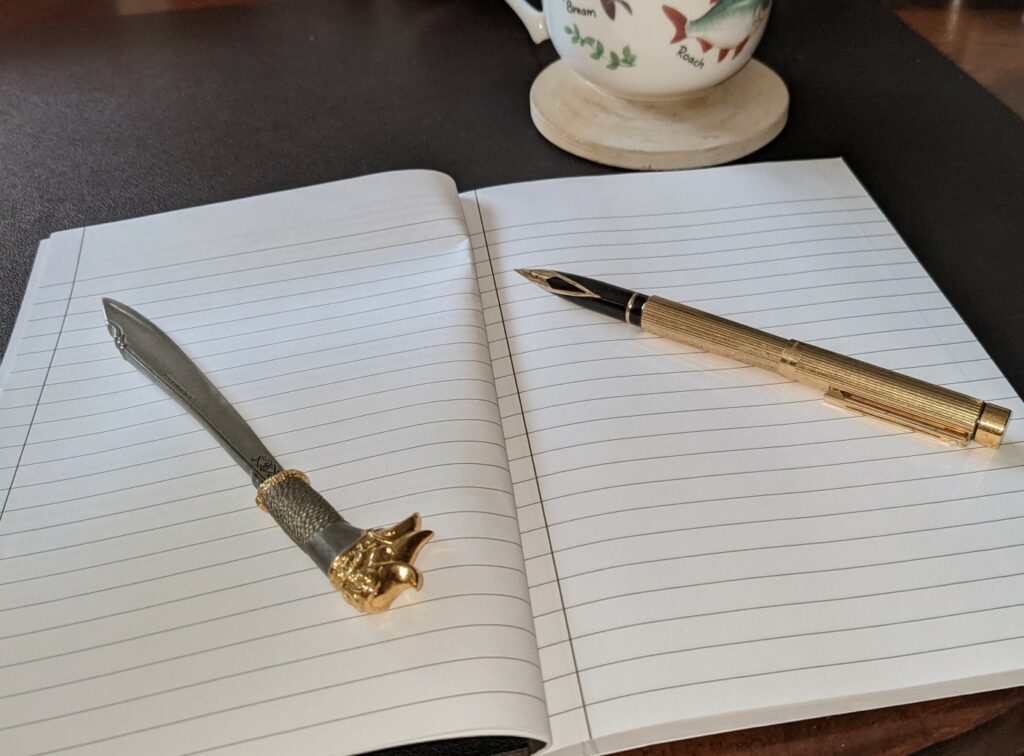Bentley and I
I sit in front of the computer, thinking. For quite a while, my fingers didn’t touch the keyboard. My mind is outside the room, which I’ve arranged so carefully to avoid any distraction. I shut the blinds to separate myself from the outside world. Bentley, my dog, and a writing companion, sits in a cushy armchair and watches my struggles.
“How is your novel doing?” dog asks after a while.
“It isn’t,” I say after a painful moment.
“Any good reason?”
“I have a writer’s block.” I finally admit the defeat.
Bentley’s head lands on the armrest. My fingers are still not near the keyboard.
“You know, you could get a job writing for Hallmark greeting card department,” he says after a while.
“I told you, I can’t write. This damned writer’s block…”
“Sure you could. You still could write cards. Those blank inside.”
It is, or it is not?
Writer’s block. Many write about this topic. It seems, if you can’t write anything productive, you could always write about what’s blocking you. And why?
“I only write when I feel like. I just make sure to feel like writing every weekday at 8 am.” I don’t remember who said it, but it sounds just about right.
Writer’s block is treated like a disease. People describe the symptoms, design treatment, and mourn the victims. I see it, however, as a part of the normal process of creation. And I’m not alone. Please look it up.
Natasha Ngan in “Overcoming Writer’s Block.”
Karen Hertzberg in “Beat Writer’s Block: 5 Tips for Writing Your Best.”
Brad Reed in his magnificent blog BradReedWrites.com
So, what’s writing?
Writing is not a linear process. It comes in spurts. The graph of writing is not a straight line. If one could write, let’s say, a hundred words per hour, by the end of a day he’ll have a five-hundred to eight-hundred words of your story. So by the end of a week, one could expect a chapter of the book. Or two. But the goals of daily writing, expressed in a word count, don’t work for me. Writing curve reminds me of a sinusoid. One day is up, the other is down. There are days I don’t write anything. You can call it a writer’s block, but for me, it’s the part of a creative process.
I found somewhere a description of writing as a constant process of problem-solving. This is quite accurate for me. On every level, from coming up with the theme of your novel, through the plot structure, character design, down to the word choice, an author has to select proper action. It happens every minute, and the choices we make are never final. And far from it. You can’t dial up a level of your creativity, and cruise at the steady speed ever since. And that’s a beauty of the entire process. Unpredictability. But it has to be said, some people are more unpredictable than others. And it shows in the final work.
There is no “surgeon’s block.”
During my fifty years in the operating room, I’ve never heard about the “surgeon’s block.” Actually, I see many similarities between surgeons and writers. Doing surgery is, just like writing, a problem-solving activity. A surgeon, just like a writer, has to show up on time and make constant choices during a process of creation. And each choice can be, and frequently is, criticized.
And yes, I do see a successful surgical operation as a piece of art.
But there’s another issue. When can one call himself a writer? That’s a touchy problem for many authors. “Am I a writer yet? Aspiring writer? Published writer? Award-winning writer? What decides when I can call myself a writer?” I think some authors think telling “I have a writer’s block” announces to the world that he must be a writer.


